 EP 01: "The Impossible Astronaut"
EP 01: "The Impossible Astronaut"Writer: Steven Moffat
Director: Toby Haynes
Plot-in-a-Sentence: The Doctor brings his friends together to watch his own death, only to reemerge from the dead and lead them all back to 1960s America, investigating the astronaut that shot him.
Thoughts: The first thing that stands out about this season is the stunning cinematography and "Astronaut" showcased that early. The epic shots of Monument Valley were an immense step up from the "quarry-in-Cardiff" style we're used to. Plus, there's that shot right above this blurb. Wow. All in all, a strong episode, which introduced the ominous Silence and set up the narrative framework for the rest of the season. Frenetic pacing at times, but not without reason.
Grade: A-

EP 02: "Day of the Moon"
Writer: Steven Moffat
Director: Toby Haynes
Plot-in-a-Sentence: The Doctor continues to investigates the Silence, a mysterious alien race who can edit themselves out of memory and are somehow connected with the Doctor's death on the beach.
Thoughts: Much more exposition-heavy than "Astronaut," "Moon" hurls you into the plot from the beginning and never lets up. Lots of cool things happen (most of them involving Richard Nixon), but the conclusion to the episode leaves a great deal of contradictory and unexplained plot holes hanging in the air. Overall, the episode feels like too many ideas trying to be told at the same time. The Silence are still a powerful concept for a villain, though, and this episode is a great showcase for their specific brand of terror.
Grade: B

EP 03: "The Curse of the Black Spot"
Writer: Steve Thompson
Director: Jeremy Webb
Plot-in-a-Sentence: The Doctor and Co. find themselves marooned on a pirate ship, while a beautiful siren menaces the crew and assorted stowaways.
Thoughts: A complete disaster. A weak concept (an episode of pirate tropes) is made even worse by dismal writing from Sherlock contributor Thompson. Plot holes galore, along with clunky dialogue, hamfisted sentiment and some truly ridiculous pirates. The cast does their best to sell the story, but are betrayed by their flimsy script and Webb's uneasy directorial debut for the show. Easily the worst episode of the Moffat era.
Grade: D

EP 04: "The Doctor's Wife"
Writer: Neil Gaiman
Director: Richard Clark
Plot-in-a-Sentence: The Doctor travels beyond the universe to a sentient asteroid, which sucks the soul of the TARDIS out of the blue box and into the body of a woman.
Thoughts: This episode is as good as "Black Spot" is bad. Gaiman's much-awaited contribution to the show does not even remotely disappoint, nor does Clark's bold directorial style. The episode's simple concept is executed beautifully and poetically, while Matt Smith delivers some of his best work opposite Suranne Jones. There's even an Ood! Love an Ood... All in all, a complete triumph.
Grade: A

EP 05: "The Rebel Flesh"
Writer: Matthew Graham
Director: Julian Simpson
Plot-in-a-Sentence: A group of miners use a substance known as the Flesh to create copies, or Gangers, of themselves, before a storm gives the Gangers their independence.
Thoughts: Strongly reminiscent of Series 5's humdrum Silurian arc, the first half of this two-part episode is surprisingly strong, getting far with a bit of atmosphere and great location scouting. Murray Gold's score is impressive throughout and the Gangers conflicts with their original versions is interesting, no matter how many cliches Graham tries to throw in the way. Solid acting from the guest stars works wonders.
Grade: B
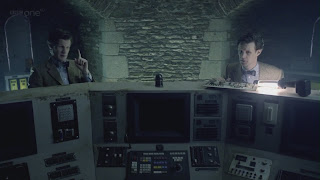
EP 06: "The Almost People"
Writer: Matthew Graham
Director: Julian Simpson
Plot-in-a-Sentence: The Gangers war against the miners becomes deadly, while two Doctors struggle to keep the two groups from tearing each other apart.
Thoughts: The Flesh arc loses steam in its second half, as the reasons for conflict become increasingly forced. Matt Smith again steals the show, this time by playing two versions of himself, but Graham cannot account for assorted plot holes and glaring questions opened up by these antics. A weak, disappointing episode overall, by the last ten minutes cannot be missed.
Grade: C+
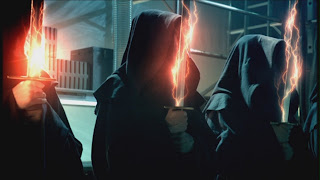
EP 07: "A Good Man Goes to War"
Writer: Steven Moffat
Director: Peter Hoar
Plot-in-a-Sentence: Old friends come to the Doctor's side as he brings the fight to his enemies in an attempt to rescue the kidnapped Amy and her newborn daughter.
Thoughts: The midseason cliffhanger aims absurdly high and somehow more-or-less hits its mark. Almost certainly Smith's finest episode to date, with innumerable great quotes and line readings. Moffat manages to cram so many different things into a brisk fifty minutes, while ensuring that almost every one feels necessary and satisfying. A truly great episode that strongly reveals the season's dark themes while providing a great deal of old-fashioned sci-fi fun. Oh, and the identity of River Song. I guess that's a big deal.
Grade: A
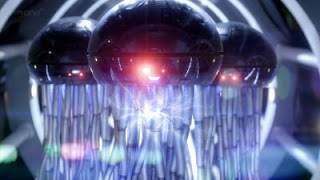
EP 08: "Let's Kill Hitler"
Writer: Steven Moffat
Director: Richard Senior
Plot-in-a-Sentence: The TARDIS finds itself in Nazi Germany, but new revelations about River Song and a mysterious, shape-changing vessel prove to be much bigger problems.
Thoughts: This episode never feels like it truly got past its hilarious title. In the most concentrated dose of exposition the show has done since the Davies years, the episode answers questions by revealing dozens more that need answering. The actors give it their best, but the script feels too crammed to be executed easily in forty-five minutes. Major props to the creation of the Tesselecta, though, especially the hilarious Antibodies. "You will experience a tingling sensation and then death." Indeed.
Grade: B-
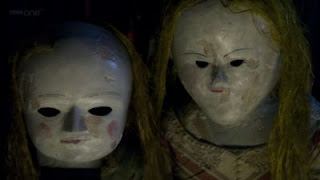
EP 09: "Night Terrors"
Writer: Mark Gatiss
Director: Richard Clark
Plot-in-a-Sentence: A young boy requires the Doctor's help after being plagued by fears of monsters in the night.
Thoughts: Gorgeous directing and a passable script from Doctor Who/Sherlock stalwart Gatiss can't completely save this episode from unavoidable Who cliches. There's the adorable child with mysterious power. Amy and Rory get trapped somewhere. And finally, the redemptive power of emotion solves all the problems. Perhaps, in a vacuum, this episode is stronger than it feels here, but after seasons of these types of things, its all starting to feel a bit boring. Creepy? Yes. Memorable? Not so much.
Grade: C+

EP 10: "The Girl Who Waited"
Writer: Tom MacRae
Director: Nick Hurran
Plot-in-a-Sentence: Amy gets stuck in a faster time stream, aging forty difficult years before Rory and the Doctor can find her.
Thoughts: In writing these reviews, I've realized how important each script is to my final grades. Make no mistake: "Girl Who Waited" looks quite stunning. However, MacRae's script is simply dreadful. Karen Gillan is a bit out-of-her-league playing Future Amy, but she's trying her damnedest and most of the blame should fall on the ridiculous lines that are being put in her mouth. A powerful visual aesthetic, complete with enemies that look like they evolved from iPods, makes this episode worth watching. Just get ready for some groaning every time Amy says "probe."
Grade: C
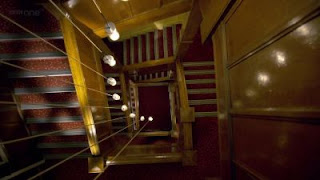
EP 11: "The God Complex"
Writer: Toby Whithouse
Director: Nick Hurran
Plot-in-a-Sentence: The gang are trapped in a hotel-like maze, complete with minotaur, while rooms with their deepest fears line the hallways.
Thoughts: The season's late-episode redemption begins here, as the seemingly inexorable slide toward mediocrity is finally stopped by this strong addition. The show gets a lot of millage of the rooms-with-fears-in-them stuff, which the cinematography and production design get to flex their muscles. The conclusion is all a bit rushed, with the Doctor reduced to rapid-fire yammering before everything settles down, but the process of getting there remains interesting, even after repeated viewings.
Grade: B+
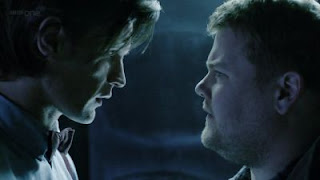
EP 12: "Closing Time"
Writer: Gareth Roberts
Director: Steve Hughes
Plot-in-a-Sentence: The Doctor calls upon Craig Owens once again, this time investigating a group of Cybermen hidden beneath a shopping mall.
Thoughts: As seemingly the only person on Earth who wasn't completely in love with Series 5's "The Lodger," I was skeptical about bringing back Craig for another adventure. Thankfully, this episode was wonderful, in the most ridiculous of ways. Adding Craig's infant son to the mix provides endless jokes and hilarious moments, contributing some needed levity to this dark season. Again, the episode's end borders on absurd, but it's all so much fun that you can look past that. A great example of what this show could look like without a regular companion attached.
Grade: A-

EP 13: "The Wedding of River Song"
Writer: Steven Moffat
Director: Jeremy Webb
Plot-in-a-Sentence: The Doctor prepares to face his death, only for River to disrupt a fixed point in time, thus forcing all of history to happen simultaneously.
Thoughts: The show's first single-episode finale continues the trend of heavy exposition and blistering pacing found in Moffat's other contributions this season. Unfortunately, where "Good Man" was thrilling and surprising, "Wedding" feels all too predictable and doesn't hold up to detailed plot analysis. Question after question pops up if you try to untangle the timeline the show has created for itself and the episode indicates that Moffat and his writers might not take the time to solve this mess. Watching all of time happen at once is a great deal of fun, but I would have preferred the show to deal with its own plotlines first before making grand, absurd gestures.
Grade: B
Final Season Grade: B. Series 6 tried to explore the Doctor's darker side, showing the side effects of his intergalactic celebrity and responsibilities to his friends. In doing so, however, the writers seemingly lost the ability to tell consistently compelling stories. There are many great things to take away from these thirteen episodes: Matt Smith has truly come into his own as the Doctor, as did Arthur Darvill as the impossibly endearing Rory. The production values and visual aesthetic of the show have never been stronger. However, until the writing returns to a higher standard, the show will continue to feel like a slight disappointment in my mind.

